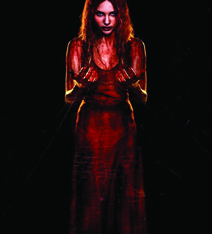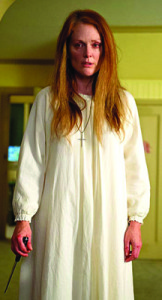
Hari ‘Carrie’

Is the ‘Carrie’ remake worth your time?
by David Goldberg
Let’s get one thing clear: this year’s Carrie remake is awful. The story has about as much coherency as alphabet soup. Honestly, is this really how teenage characters are supposed to talk? This time around, the title character (Chloë Grace Moretz) isn’t an outsider who loses it in a delicious spray of blood and hormones—she’s a hotter, duller, dumber Matilda. And I’ll tell you right now: Julianne Moore does not pull her weight. She’s ditchwater.
Strung together quickly and held together by grimy violence and no subtext, Carrie is not just bloody, it’s constipated. But so what? There are plenty of bad remakes out there. I sat through 2011’s odorous and onerous Conan the Barbarian because I wanted to see Rose McGowan play a slutty sorceress (and I certainly got my money’s worth). Who cares? We all know these half-ass studio attempts will never compare to their predecessors. And if we do get a nice remake (like last year’s sweet and gooey Evil Dead or Fright Night, starring a loaded Colin Farrell), then we’ve got a nice companion to the original—an anniversary dinner to go with the memories of our first kiss.
But here’s the thing with the remake of Carrie that complicates things for the LGBT crowd: it’s directed by Kimberly Peirce. Although Carrie is Peirce’s third film, she’s the kind of director whose name elicits solemn stares and portents of groundbreaking potential. And that’s probably for good reason: her 1999 debut, Boys Don’t Cry, will always hold a sturdy patch in LGBT cinematic

history. Peirce is an out lesbian and a feminist, and has made no compromises with her politics and personal life. So does that make me a traitor to my kind for wanting to tear Carrie posters off of buses and punch Chloë Grace Moretz in the face?
We’re in a complicated time when it comes to the queer presence in the entertainment industry. We’ve just started to peel the egg when it comes to convincing straight people that, yes, gay people can be funny or talented and can’t actually spread venereal disease through TV screens. Queer performers and creators have ascended to a new level of acceptance—and, with queer-aligned and feminist institutions like Lena Dunham and Tina Fey on the rise, it looks like we may have a shot at making progress in all media.
As queer viewers and commentators, many of us feel a need to be supportive of all gay characters, performers, and creators. We know that executives and producers still marginalize gays on screen or make them sideshow background characters with flaccid sex lives and pathetic pratfalls. And we know how fickle the straight media can be—often overlooking good media (i.e., Shameless) for loud media (Glee). So how do we reconcile? Do we support our family members, even if we secretly can’t stand them, or do we stomp on their flame, only to confirm the suspicions of those who don’t believe in any of us? I don’t care for Zachary Quinto as Spock in the new Star Trek films, but shouldn’t I keep my mouth shut and just be impressed than an out actor is playing a major movie character? What comes first: quality or quantity?
In order to do what’s really right for our kind, we’re going to have to be bitches. We’re going to have to run through the streets and scream to the world that Sean Saves the World episodes should be used as torture in Siberian prison camps. We should be mortified that Amber Tamblyn’s lesbian character is the new half-man on Two and a Half Men. We should turn the winter Olympics ice-skating commentary on mute when Johnny Weir appears at the microphone.
Look, we’ve been denied queer-created content for too many years. Now that we’re getting more of it, we shouldn’t have to settle. We deserve the best, and it’s our right to punish our brethren when they’ve been bad. We can’t coddle gay creators just because we’re afraid of seeming bitchy and ungrateful to the straight entertainment industry. We have to be unforgettable. We have to be fantastic. We have to be essential, or else they really may want to shut us down. It’s a sign of progress that we’ve become prolific enough to make both good and bad media. But in order to become essential, we must try harder. Support LGBT creators. Praise them when they succeed. Be honest when they fail.
So, if I ever see Kimberly Peirce, I’ll be sure to tell her that Carrie was a cold red turd. I’ll tell her that I expect more from her. As one of the ten people in this country who went to see Carrie, it’s my right to make demands, damn it.
David Goldberg also writes about Camp True Colors in this issue of OutSmart magazine.










